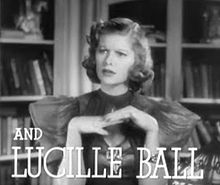Lucille Ball
Appearance

Lucille Désirée Ball (August 6, 1911 – April 26, 1989) was an American comedian, actress and star of the sitcoms I Love Lucy, The Lucy Show and Here's Lucy and charter member of the Television Hall of Fame.
Quotes
[edit]- Knowing what you can not do is more important than knowing what you can do. In fact, that's good taste.
- Quoted in Eleanor Harris, The Real Story of Lucille Ball, ch. 1 (1954)
- You see much more of your children once they leave home.
- Quoted in Carolyn Warner, The Last Word, ch. 16 (1992)
Love, Lucy (1996)
[edit]- Written during the 1960's, published 1996
- I don't suppose that hard work, discipline, and a perfectionist attitude toward my work did me any harm. They are a big part of my makeup today, as any of my co-workers will tell you. And when life seemed unbearable, I learned to live in my imagination, and to step inside other people's skins- indispensable abilities for an actress.
- pp. 9-10
- People with happy childhoods never overdo; they don't strive or exert themselves. They're moderate, pleasant, well liked, and good citizens. Society needs them. But the tremendous drive and dedication necessary to succeed in any field- not only show business- often seems to be rooted in a disturbed childhood. I wasn't an unloved or an unwanted child, but I was moved around a lot, and then death and cruel circumstances brought many painful separations.
- p. 21

- Here's what I advise any young struggling actress today: The important thing is to develop as a woman first, and a performer second. You wouldn't prostitute yourself to get a part, not if you're in the right mind. You won't be happy, whatever you do, unless you're comfortable with your own conscience.
- p. 42
- Russell Markert, Lela Rogers, Ed Sedgwick - these were but a few of the experienced theater people who generously gave me a boost. I have a theory about the assists we get in life. Only rarely can we repay those people who helped us, but we can pass that help along to others. That's why, in 1958, I reactivated Lela's theater workshop with two dozen talented kids trying to get started in show business.
- p. 79
- My ideal of womanhood has always been the pioneer woman who fought and worked at her husband's side. She bore the children, kept the home fires burning; she was the hub of the family, the planner and the dreamer.
- p. 113
- This was the heyday of the movies; it was hard to keep a level head and one's sense of values. MGM made over-worked, spoiled idols out of Judy Garland, Mickey Rooney, and Elizabeth Taylor; it wasn't the kids' fault, nor the studio's, it was the System. I too was on the spoiling list for a while, but I didn't go along with it.
- p. 137
- I closed my eyes, put blinders on, and ignored what was too painful to think about. I tried to view my troubles less seriously, and worry less. I tried to curb my temper. Things said in embarrassment and anger are seldom the truth, but are said to hurt and wound the other person. Once said, they can never be taken back.
- p. 141

- For there's a lot of masochism in the acting profession. We're willing to take a lot of punishment, but the minute we hit a little bit of success we are liable to run from it. We're frightened of it and develop all kinds of phobias as a consequence. Outsiders who don't understand think we have a chip on our shoulder, but it's not that at all. We're so used to failure, to being hurt and rebuffed, that we can easily come unhinged by success.
- p. 197
- When you're too mad and too rattled to see straight, you're bound to make mistakes. You can't go on and on for years being miserable about a situation and not have it change you. You get so you can't stand yourself.
- p. 212
- Children internalize their parents' unhappiness. Fortunately, they absorb our contentment just as readily.
- p. 235
External links
[edit]- Official website
- Lucille Ball on IMDb
- Lucille Ball at the Notable Names Database
- Lucille Ball at the Internet Broadway Database
- Lucille Ball at the Museum of Broadcast Communications
- New York Times obituary
- Lucille Ball biography on TVLand.com


